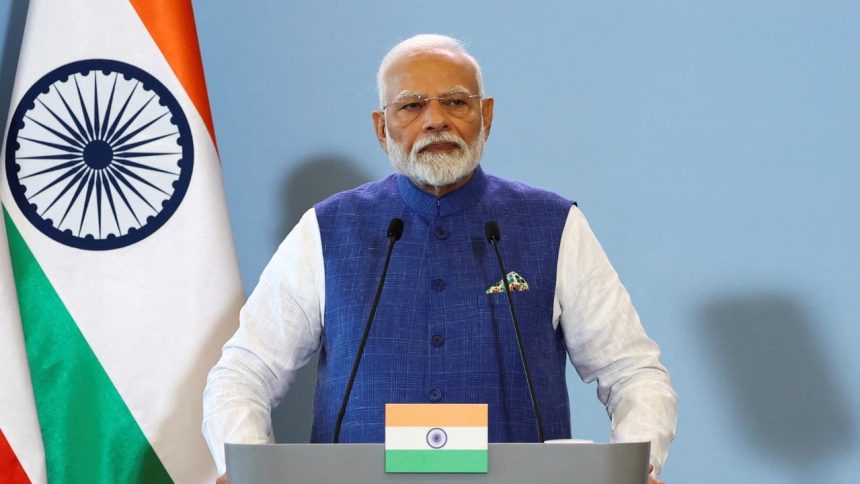New Delhi: As Prime Minister Narendra Modi turns 74 today, huge strides in international diplomacy have marked his 10-year tenure. Since he assumed office in 2014, the PM has transformed India’s global footprint, fostering strategic partnerships, promoting economic cooperation and has asserted India’s influence on the global stage.
Neighbourhood First Policy
Modi’s diplomatic strategy began with the Neighbourhood First policy. It strengthened ties with the nearby nations. He invited SAARC leaders to his swearing-in ceremony, which sett the tone for regional cooperation. The approach led to enhanced relationships with Bhutan, Nepal, and Bangladesh, resolving long-standing issues such as the Indo-Bangladesh boundary dispute.
Act East Policy
PM Modi’s Act East Policy has improved India’s economic, strategic and cultural ties with East Asia. It has increased trade with ASEAN, Japan, South Korea and Australia and also improved connectivity through projects like the India-Myanmar-Thailand Highway. The policy strengthens India’s global presence. It also fostered growth and cultural exchange.
G-20 Presidency
In September 2023, India hosted the G-20 Summit. This a testament to PM Modi’s diplomatic prowess. The event brought together leaders from the world’s top economies, focusing on global challenges, climate change and economic growth. India’s G-20 presidency highlighted its rising global influence and PM Modi’s ability to bring the different countries together.
Countering Pakistan-sponsored terrorism
India has shown steadfast determination in combating the Pakistan-sponsored terrorism under PM Modi’s leadership. By diplomatically isolating Pakistan and pointig out its human rights abuses in Balochistan, Gilgit-Baltistan and Pakistan-occupied Kashmir, India has ensured international pressure on Pakistan to act against terror sanctuaries.
Multilateral Engagements
PM Modi has also cultivated robust relationships with all the major world powers, including the US, Japan and Russia. The partnerships have enhanced defence cooperation, trade, energy and space collaboration. Apart from that, PM Modi has actively participated in prominent international forums like BRICS, Shanghai Cooperation Organisation and the United Nations.
Soft Power Diplomacy
Under PM Modi’s leadership, India has harnessed the power of its rich cultural and spiritual heritage to build bridges with the world. The global celebration of Yoga Day has become a symbol of India’s soft power, which showcased the country’s ancient wisdom and its benefits for global health. The promotion of Ayurveda and traditional medicine has opened up new avenues for cultural exchange, while people-to-people ties have deepened India’s connections with the countries across the world. It has facilitated greater cooperation and mutual understanding.
Economic Diplomacy
Economic diplomacy has been a priority, with ‘Make in India’ initiatives abroad, increased FDI inflows, infrastructure development partnerships and internationalisation of the Indian rupee. Modi has also leveraged India’s cultural and spiritual heritage through soft power diplomacy, promoting Yoga Day celebrations worldwide, Ayurveda, and traditional medicine.
Key Diplomatic Achievements
The nation has achieved several key diplomatic milestones under PM Modi’s leadership. Notably, India launched the International Solar Alliance (ISA), a vital initiative promoting sustainable energy globally. The Modi government also played a crucial role in the adoption of the Paris Agreement on climate change, demonstrating India’s commitment to environmental protection. Furthermore, India’s entry into the Missile Technology Control Regime (MTCR) has boosted its credentials as a responsible nuclear power.
That apart, PM Modi has been a vocal advocate for UNSC reforms and pushed for a more inclusive and representative global governance structure. India’s membership in the Shanghai Cooperation Organization (SCO) and its founding role in the Asian Infrastructure Investment Bank (AIIB) demonstrate its growing influence in regional and global economic forums. PM Modi has also successfully strengthened ties with the Gulf Cooperation Council (GCC) and improved cooperation with Africa through the India-Africa Forum Summit and has expanded India’s strategic and economic footprint
India’s rise on the world stage
PM Modi’s leadership has comprehensively addressed various challenges of the world. The Modi government has prioritised disaster relief and humanitarian help and provided critical aid to countries in need. Apart from that, cybersecurity initiatives have been launched to safeguard India’s digital landscape and collaborate with international partners. Climate change mitigation efforts have also been a key focus area, with India emerging as a global leader in renewable energy.
PM Modi’s diplomatic outreach has been extensive, with notable statistics praising his commitment to international engagement. During his tenure, he has undertaken over 95 foreign trips, engaged with world leaders and fostering strategic partnerships. Furthermore, 40+ bilateral visits have strengthened ties with key nations, while 100+ international agreements have been signed, spanning areas like trade, defence and culture. India’s growing global influence is also reflected in the 50+ heads of state visits to the country. This has demonstrated the world’s increasing interest in partnering with India.
